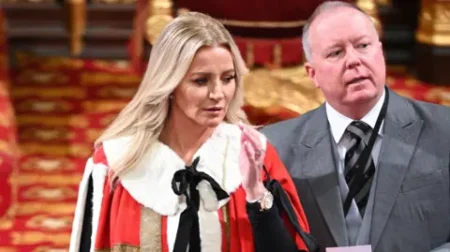The introduction of a new water ombudsman aims to confront pressing issues such as leaking pipes and incorrect billing practices. This initiative was announced by the UK government and is intended to bolster consumer protection within the water services industry. The initiative comes amid mounting public dissatisfaction, primarily driven by soaring water bills and an alarming increase in sewage discharges into the nation’s waterways. As the administrative landscape of the water sector undergoes significant changes, the introduction of a consumer champion is viewed as a critical step toward ensuring accountability and transparency among water service providers.
The forthcoming reforms are set against the backdrop of a significant review conducted by the Water Commission, which is expected to make its findings public shortly. Environment Secretary, Steve Reed, has been vocal about the necessity for these changes, articulating a strategic goal to halve the number of sewage discharges by 2030. This marks a notable first for the government, establishing a concrete target aimed at curbing environmental pollution. Reed has categorically stated that the current state of the water sector is “broken” and has criticized the existing regulatory framework as being “clearly failing” to meet the needs of consumers.
In his recent appearance on BBC, Secretary Reed emphasized the importance of improving water quality, asserting that if no tangible advancements are observed by the next election, he would be held accountable by voters. Nevertheless, Reed refrained from confirming whether the regulator, Ofwat, would be entirely disbanded, which could very well be a recommendation in the report anticipated from the Water Commission.
In a parallel vein, Feargal Sharkey, the former frontman of the band Undertones and an active campaigner for clean waterways, has expressed skepticism regarding the potential impact of the report. He labeled the anticipated outcomes as possibly insufficient, fearing they might not adequately tackle the serious issues endemic to the water sector, potentially resulting in a lackluster report unworthy of the urgent need for reform.
The establishment of a consumer watchdog marks a significant development in water services. This consumer ombudsman will function as a centralized hub for individuals lodging complaints, aligning the water sector more closely with how other utilities operate. Additionally, the Consumer Council for Water (CCW) will see its role expanded, enhancing its capacity to handle complaints from the public. The Department for Environment, Food, and Rural Affairs (Defra) has confirmed that the new ombudsman will possess legal authority to intervene on behalf of consumers embroiled in disputes with their water providers, a move anticipated to streamline the resolution process and bolster consumer rights.
These developments occur in a context characterized by broad public dissatisfaction over the management of the UK’s water resources, notably due to the rising levels of sewage discharge and the growing consensus that more robust government intervention is necessary. The infrastructure of the water industry requires urgent modernization to accommodate the needs of a burgeoning population and to address the growing effects of climate change, which exert significant pressure on existing systems.
As evidence of these issues mounts, data from the Environment Agency indicates that sewage discharges into England’s waterways reached a shocking 2,801 instances. Reed voiced the widespread frustration he has encountered while speaking with constituents, underscoring a palpable public outcry regarding water quality issues. A recent survey conducted by the CCW revealed that trust in water companies is at a downturn, with only a minor 35% of respondents believing their providers are actively working to protect the environment.
Looking forward, a historic £104 billion investment is set to be poured into the water sector over the next five years to enhance infrastructure. However, as a result, consumers can expect an increase in their annual bills, with projections indicating an average rise of £123, and Southern Water customers could see spikes as high as £224.
While Victoria Atkins, the shadow environment secretary, endorsed the initiation of a new ombudsman, she cautioned that this would only serve as a small piece of the larger puzzle in resolving long-standing issues within the water industry. She insisted on transparency regarding funding sources for these reforms and called for a coherent strategy to overhaul or replace Ofwat to foster cleaner rivers and lakes. Meanwhile, Tim Farron, the Liberal Democrats’ environment spokesperson, stressed that to genuinely address the sewage crisis, deeper structural changes are needed beyond mere bureaucratic adjustments. However, he also recognized that a new ombudsman could offer necessary redress for aggrieved consumers who have borne the burden of failing water companies for too long.











